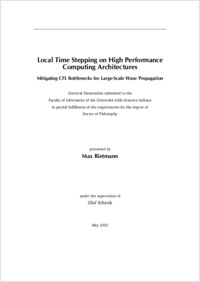Local time stepping on high performance computing architectures : mitigating CFL bottlenecks for large-scale wave propagation
- Rietmann, Max
- Schenk, Olaf (Degree supervisor)
-
12.05.2015
132 p
Thèse de doctorat: Università della Svizzera italiana, 2015
English
Modeling problems that require the simulation of hyperbolic PDEs (wave equations) on large heterogeneous domains have potentially many bottlenecks. We attack this problem through two techniques: the massively parallel capabilities of graphics processors (GPUs) and local time stepping (LTS) to mitigate any CFL bottlenecks on a multiscale mesh. Many modern supercomputing centers are installing GPUs due to their high performance, and extending existing seismic wave-propagation software to use GPUs is vitally important to give application scientists the highest possible performance. In addition to this architectural optimization, LTS schemes avoid performance losses in meshes with localized areas of refinement. Coupled with the GPU performance optimizations, the derivation and implementation of an Newmark LTS scheme enables next-generation performance for real-world applications. Included in this implementation is work addressing the load-balancing problem inherent to multi-level LTS schemes, enabling scalability to hundreds and thousands of CPUs and GPUs. These GPU, LTS, and scaling optimizations accelerate the performance of existing applications by a factor of 30 or more, and enable future modeling scenarios previously made unfeasible by the cost of standard explicit time-stepping schemes.
- Language
-
- English
- Classification
- Computer science and technology
- License
-
License undefined
- Identifiers
-
- RERO DOC 255915
- URN urn:nbn:ch:rero-006-114196
- ARK ark:/12658/srd1318539
- Persistent URL
- https://n2t.net/ark:/12658/srd1318539
Statistics
Document views: 284
File downloads:
- Texte intégral: 203
